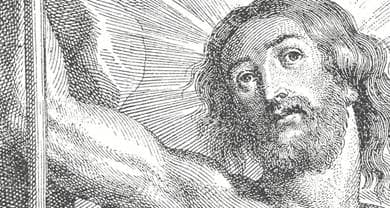- Trending:
- Pope Leo Xiv
- |
- Israel
- |
- Trump
- |
- Social Justice
- |
- Peace
- |
- Love

RELIGION LIBRARY
Anglican/Episcopalian
Leadership
Anglican clergy are divided into three categories or orders: bishops, priests, and deacons. A threefold ministry (bishops, presbyters (elders), deacons) dates back at least as far as the early 2nd century, possibly earlier.
The highest order of ministry is the office of the bishop. In much of Anglicanism there are archbishops, but these are not of a higher order of ministry. Archbishop is the usual title conferred on a bishop whose area of jurisdiction is a province (collection of dioceses) rather than a diocese. An archbishop is a head bishop in a province. In some provinces the head bishop is called by another title, e.g., the Presiding Bishop in the U.S. Episcopal Church. The generic term for head bishops is "primate."
Bishops are the chief pastors and heads of their respective dioceses. They are pastors to the other clergy as well as the laity. A bishop must visit the parishes in his or her diocese, exercise discipline (often through delegates) over diocesan clergy, and uphold the doctrines of the faith. A bishop might have subordinate bishops (e.g., suffragans) to assist in meeting the needs of the diocese. Only a bishop can perform the rites of ordination and confirmation.
Ordinarily a bishop is ordained (consecrated) by an archbishop or other primate, and two other bishops. Anglicanism is one of only a few Protestant traditions that retain the title of bishop, and one of extremely few that claim the apostolic succession of their bishops. Apostolic succession holds that, just as Christ consecrated (set apart) and sent out the apostles, so also the apostles consecrated individuals to pastor the Church in given areas, and those who were consecrated did the same for their successors, and so on in an unbroken chain down through history. Apostolic succession is also called episcopal succession, from the Greek word that is translated bishop. It is for this reason that many Anglican bodies are self-styled as Episcopal (for instance, America's The Episcopal Church).
Anglicanism places a high value on its participation in apostolic succession. Episcopacy is viewed as a defining feature of Anglicanism and a ground of ecumenical ties with other Christian traditions. The unity of the Church is embodied in the historic episcopate, which is why the realignment taking place in the Anglican Communion is such a source of pain for bishops across the theological spectrum.
The next order of Anglican clergy is that of priest. Early in Christian history, as the idea of the Eucharist as a sacrifice developed, so did the idea of presbyters as priests. Over time the clergy came to be seen as representing both the people to God and God to the people. Priests were seen as having supernatural powers imparted to them upon their ordination, powers connected with the sacraments. Thus, the priest had the power to absolve of sins, to bring about the substantive change in the Eucharistic elements from bread and wine to body and blood (transubstantiation ), and to repeat the sacrifice of Christ to God in the Mass.
During the Reformation, Protestants rejected the priesthood as a sacred order empowered to stand between God and God's people, favoring instead the idea of a priesthood of all believers. All believers have access to God personally. Anglicanism followed this view. Nevertheless, the Anglican liturgy retained the word "priest," perhaps to indicate the priest's authority to conduct the service of Holy Communion. The term was immediately disfavored in much of England, but returned to the fore with the rise of Anglo-Catholicism. Many Anglicans today seem comfortable with the clerical label of priest, without associating the term with a sacrificial priesthood. Some Anglo-Catholics do view the priesthood in sacerdotal (sacrificial) terms, and some Anglicans of particularly Evangelical inclination are simply uncomfortable with the term priest at all.
In any case, Anglican priests do at least serve as the pastors of their parishes. They preach; celebrate the Eucharist; teach on matters of the faith; provide spiritual guidance; minister to the sick, distressed, and homebound; baptize babies and new confessors of the faith; perform wedding ceremonies; and preside at burial services.
The third order of ministry is the diaconate, or order of deacons. Originally deacons were charged with the service of, and distribution of alms to, the poor (Acts 6:1-6). The duties of the office have not been consistent over time or from place to place, but it has remained essentially a subordinate and assisting order. In Anglicanism, the office of deacon evolved into simply the first stage of ordained ministry, to be followed by ordination to the priesthood. However, the permanent diaconate has become more common in recent years across various provinces. The powers of a deacon include preaching and all sacramental rites except consecration of the Eucharistic elements.
The role of the laity in Anglican leadership and ministry is variable. Financial and administrative oversight of a parish is usually entrusted to a "vestry" or board of lay people elected by parishioners. Some vestries are involved in spiritual leadership and direction of the parish as well. Lay people are often selected to read the appointed scriptures during the worship service, and to help administer Communion. In some provinces there are designated lay people who share in the preaching duties, and in many locales preaching by a lay person is permitted now and then. In some provinces, for example the U.S. Episcopal Church, laypersons are officially recognized as ministers: "The ministers of the Church are laypersons, bishops, priests, and deacons" (Book of Common Prayer, 855). The laity may generally be thought of as the main executors of evangelism and ministries to the needy, regardless of whether they collectively live up to that billing.
Study Questions:
1. Describe the hierarchy of leadership within the Anglican Church.
2. What is apostolic succession? Why is it important to Anglicanism?
3. Why is ordination important to Anglican leadership? How does it affect one’s ability to perform the sacraments?
4. What is the role of the Anglican priest? The deacon?
5. How can Anglican laity take an active role in leadership?










